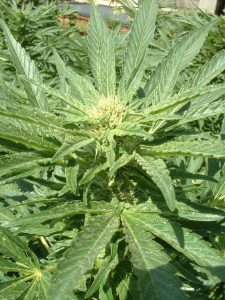Free Weed Comes With a Hefty Price Tag
A recent bill out of the California state house would make marijuana compassionate-care programs exempt from the substantial state taxes on the medical cannabis that they supply to patients in need. SB 829 corrects a hole in Proposition 64, which saddled these not-for-profit organizations with taxes. The Compassionate Use Act of 1996 made medical marijuana legal in California, which spurred the birth of compassionate-care programs for patients with serious health issues and financial restraints. According to NORML, these organizations have been able to donate product and function tax-free up until this year when recreational marijuana became legal.
substantial state taxes on the medical cannabis that they supply to patients in need. SB 829 corrects a hole in Proposition 64, which saddled these not-for-profit organizations with taxes. The Compassionate Use Act of 1996 made medical marijuana legal in California, which spurred the birth of compassionate-care programs for patients with serious health issues and financial restraints. According to NORML, these organizations have been able to donate product and function tax-free up until this year when recreational marijuana became legal.
What did recreational legalization have to do with medical marijuana patients and associated care programs? As our marijuana attorneys can explain, after voters approved Proposition 64, government representatives and officials began ironing out how the recreational program would work. It was determined a set of guidelines was needed that could pull together the medical marijuana industry (which had been active for 20 years) with the new recreational cannabis law. That is when MAUCRSA (Medicinal And Adult-Use Cannabis Regulatory Safety Act) was born. What was intended to streamline rules and make things easier for business owners, customers, and law enforcement officials ended up strapping medical marijuana institutions with a significant number of regulations they previously did not have to follow. Continue reading
 Cannabis Law Group's Medical Marijuana Legal Blog
Cannabis Law Group's Medical Marijuana Legal Blog





 grown for research purposes in the U.S. and decrease the amount of opioid drugs produced under the group’s watch. You heard that right. The same organization whose leaders for years have been wringing their collective hands over marijuana, who said we simply did not know enough about its effects, who defended its Schedule I classification, might finally be waking up to smell the coffee the rest of the country has been happily sipping for some time now.
grown for research purposes in the U.S. and decrease the amount of opioid drugs produced under the group’s watch. You heard that right. The same organization whose leaders for years have been wringing their collective hands over marijuana, who said we simply did not know enough about its effects, who defended its Schedule I classification, might finally be waking up to smell the coffee the rest of the country has been happily sipping for some time now. than opioid addiction. Both U.S. and Canadian governments have dubbed the rapid increase in overdoses to be a crisis or epidemic. Meanwhile, cannabis has demonstrated itself to be the potential key to unlocking the addictive cycles, adding to the urgency in passing more effective medical marijuana laws. In New York, emergency rules have been put in place to allow medical marijuana as an opioid replacement. Yet in Ontario, where medical marijuana is permitted at the federal level for a variety of conditions, workers are still having opioids pushed on them.
than opioid addiction. Both U.S. and Canadian governments have dubbed the rapid increase in overdoses to be a crisis or epidemic. Meanwhile, cannabis has demonstrated itself to be the potential key to unlocking the addictive cycles, adding to the urgency in passing more effective medical marijuana laws. In New York, emergency rules have been put in place to allow medical marijuana as an opioid replacement. Yet in Ontario, where medical marijuana is permitted at the federal level for a variety of conditions, workers are still having opioids pushed on them. Rep. Sheryl Delozier (R-Cumberland) is working on a bill that would exempt medical marijuana patients from an overbearing law that prevents them from ever being allowed to drive, according to
Rep. Sheryl Delozier (R-Cumberland) is working on a bill that would exempt medical marijuana patients from an overbearing law that prevents them from ever being allowed to drive, according to  is bringing their findings to the global stage. WHO was tasked by secretary general of United Nations to deliver a recommendation on the level of international control necessary for cannabis, according to a
is bringing their findings to the global stage. WHO was tasked by secretary general of United Nations to deliver a recommendation on the level of international control necessary for cannabis, according to a  treatment from their vet?
treatment from their vet? ignore marijuana crimes so along as alleged violators were in compliance with state laws. This step gave states the space to figure out how they wanted to handle recreational and/or medical cannabis laws without interference from the federal government.
ignore marijuana crimes so along as alleged violators were in compliance with state laws. This step gave states the space to figure out how they wanted to handle recreational and/or medical cannabis laws without interference from the federal government.